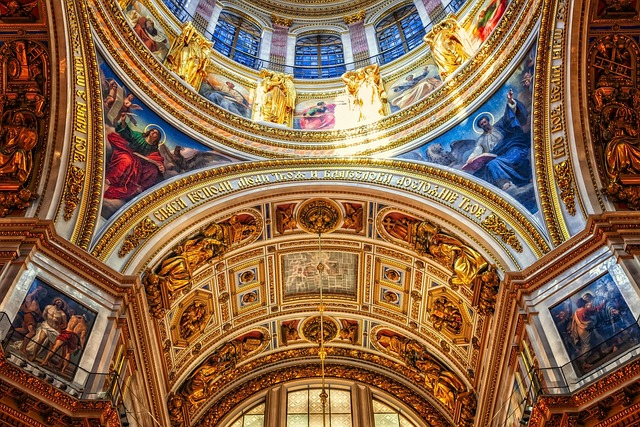Orthodoxy, also known as Eastern Orthodox Christianity, is a branch of Christianity that traces its origins back to the early Church. It is characterized by its rich liturgical traditions, sacramental theology, and emphasis on spiritual growth and transformation. If you are considering becoming Orthodox, it is important to understand the beliefs, practices, and commitments involved in this faith tradition. This introduction aims to provide a brief overview of some key aspects to help you make an informed decision.
Table of Contents
The History and Beliefs of Orthodox Christianity
Orthodox Christianity is a branch of Christianity that has a rich history and a unique set of beliefs. If you’re considering becoming Orthodox, it’s important to understand the background and core principles of this faith. In this article, we’ll explore the history and beliefs of Orthodox Christianity to help you make an informed decision.
Orthodox Christianity traces its roots back to the early days of Christianity, when the apostles spread the teachings of Jesus Christ. The word “Orthodox” itself means “correct belief” or “right worship,” emphasizing the importance of adhering to the original teachings of Christ and the early Church. This commitment to tradition is a defining characteristic of Orthodox Christianity.
One of the key aspects of Orthodox Christianity is its emphasis on the sacraments. The sacraments are seen as tangible ways to experience God’s grace and presence. The most important sacraments are baptism and the Eucharist, or Holy Communion. Through these sacraments, Orthodox Christians believe they are united with Christ and receive spiritual nourishment.
Another distinctive feature of Orthodox Christianity is its veneration of icons. Icons are religious images that depict Christ, the Virgin Mary, and various saints. Orthodox Christians believe that these icons are not mere paintings or decorations, but windows into the divine. Icons are used in worship and prayer to help believers connect with the spiritual realm.
Orthodox Christianity also places a strong emphasis on the role of the Church and its hierarchy. The Church is seen as the body of Christ on earth, and its leaders, including bishops and priests, are believed to have a special role in guiding and shepherding the faithful. The Church’s teachings and traditions are considered authoritative and are upheld as the true interpretation of Scripture.
In terms of worship, Orthodox Christianity is known for its liturgical and ceremonial approach. Services are often conducted in ancient languages such as Greek or Slavonic, and they follow a set structure that has been passed down through the centuries. The use of incense, candles, and elaborate vestments adds to the sense of reverence and awe during worship.
Orthodox Christianity also has a strong sense of community and fellowship. The faithful gather regularly for worship, prayer, and fellowship, and they support one another in times of need. The Church is seen as a spiritual family, and its members are encouraged to live out their faith in their daily lives, showing love and compassion to others.
While Orthodox Christianity has a rich history and a deep spiritual tradition, it may not be the right fit for everyone. It’s important to carefully consider your own beliefs, values, and spiritual needs before making a decision. If you’re drawn to the beauty and depth of Orthodox Christianity, it may be worth exploring further and connecting with a local Orthodox community to learn more.
In conclusion, Orthodox Christianity is a branch of Christianity with a long and storied history. Its emphasis on tradition, sacraments, icons, and community sets it apart from other Christian denominations. If you’re considering becoming Orthodox, take the time to learn about its beliefs and practices, and seek guidance from those who are already part of this faith. Ultimately, the decision to become Orthodox is a personal one that should be made with careful consideration and prayer.
The Role of Tradition and Ritual in Orthodox Worship

Orthodox Christianity is a rich and ancient faith that has captivated the hearts of millions of believers around the world. Its worship is steeped in tradition and ritual, creating a unique and profound experience for those who participate. If you are considering becoming Orthodox, it is important to understand the role that tradition and ritual play in this form of worship.
Tradition is at the core of Orthodox Christianity. The Orthodox Church traces its roots back to the early Christian communities established by the apostles themselves. This unbroken chain of tradition is seen as a direct link to the teachings and practices of Jesus Christ and the early Church. Orthodox Christians believe that by adhering to these ancient traditions, they are preserving the true essence of the faith.
One of the most striking aspects of Orthodox worship is its emphasis on ritual. From the moment you step into an Orthodox church, you are enveloped in a sensory experience unlike any other. The sights, sounds, and smells all work together to create a sacred atmosphere that transports you to a different realm.
The use of icons, or religious images, is a prominent feature of Orthodox worship. Icons are not seen as mere decorations but as windows into the divine. They serve as a visual reminder of the presence of God and the saints, and are venerated as a way of showing respect and honor. The act of kissing an icon or lighting a candle before it is a tangible expression of devotion and a way of connecting with the spiritual realm.
Another important aspect of Orthodox worship is the use of incense. The sweet-smelling smoke that fills the air during the service is believed to symbolize the prayers of the faithful rising up to heaven. The scent of incense is also said to have a purifying effect, helping to create a sense of holiness and reverence.
The liturgy, or the order of worship, is a central part of Orthodox tradition. The Divine Liturgy, which is celebrated every Sunday and on major feast days, follows a set structure that has remained largely unchanged for centuries. This consistency allows Orthodox Christians to participate in a worship service that has been passed down through generations, connecting them to the faithful who came before them.
The use of chant is another distinctive feature of Orthodox worship. The melodies and rhythms of the hymns are carefully crafted to evoke a sense of awe and wonder. Chanting is not simply a form of musical expression but a way of praying and praising God. The repetitive nature of the chants helps to quiet the mind and open the heart to the presence of God.
While tradition and ritual are central to Orthodox worship, they are not meant to be empty rituals devoid of meaning. Rather, they are meant to be vehicles through which believers can encounter the divine. The repetition of prayers, the use of icons, and the participation in the liturgy all serve to create a sacred space where believers can experience the presence of God in a tangible way.
If you are considering becoming Orthodox, it is important to reflect on the role that tradition and ritual play in your own spiritual journey. Are you drawn to the sense of continuity and connection that comes from participating in a worship service that has been celebrated for centuries? Do you find solace and inspiration in the beauty and symbolism of Orthodox worship? These are questions worth pondering as you explore the possibility of embracing this ancient faith.
In conclusion, the role of tradition and ritual in Orthodox worship is profound and transformative. It is through these ancient practices that believers are able to connect with the divine and experience the presence of God in a tangible way. If you are considering becoming Orthodox, take the time to explore and understand the significance of tradition and ritual in this form of worship. It may just be the path that leads you to a deeper and more meaningful relationship with God.
Exploring the Sacraments and Liturgical Practices in Orthodoxy
Are you considering becoming Orthodox? Exploring the sacraments and liturgical practices in Orthodoxy is an important step in making an informed decision. Orthodoxy is known for its rich and ancient traditions, and understanding these practices can help you determine if this path is right for you.
One of the key aspects of Orthodoxy is its emphasis on the sacraments. The sacraments are seen as a means of experiencing the grace of God and participating in the life of the Church. Baptism, for example, is not just a symbolic act but a transformative experience where one is united with Christ and becomes a member of the Church. The Eucharist, or Holy Communion, is also central to Orthodox worship. It is believed to be the true body and blood of Christ, and receiving it is seen as a participation in the divine life.
In addition to the sacraments, the liturgical practices in Orthodoxy are deeply rooted in tradition. The Divine Liturgy, the primary worship service in Orthodoxy, is a beautiful and solemn experience. The use of incense, icons, and chant creates a sense of reverence and awe. The liturgy is conducted in a language that may be unfamiliar to you, such as Greek or Slavonic, but many Orthodox churches also offer services in English. Attending a liturgy can be a transformative experience, allowing you to witness the beauty and depth of Orthodox worship firsthand.
Orthodoxy also places a strong emphasis on prayer. The Jesus Prayer, a short prayer repeated continuously, is a common practice among Orthodox Christians. This prayer helps to cultivate a constant awareness of God’s presence and a deepening of one’s relationship with Him. The Orthodox Church also has a rich tradition of prayer through the use of icons. Icons are not worshipped but venerated as windows into the divine. They serve as aids in focusing one’s attention and connecting with the spiritual realm.
Another important aspect of Orthodox liturgical practices is fasting. Fasting is seen as a spiritual discipline that helps to purify the body and soul. The Orthodox Church has specific fasting periods throughout the year, such as Great Lent and Advent, where certain foods are abstained from. Fasting is not just about abstaining from food but also about cultivating self-control and redirecting one’s desires towards God.
Exploring the sacraments and liturgical practices in Orthodoxy can be a transformative journey. It is important to approach this exploration with an open mind and a willingness to learn. Attending services, speaking with Orthodox clergy and members of the community, and reading books on Orthodoxy can all be helpful in gaining a deeper understanding of these practices.
Ultimately, the decision to become Orthodox is a personal one. It is important to prayerfully consider your own spiritual journey and seek guidance from trusted mentors or spiritual advisors. Orthodoxy offers a rich and ancient tradition that can provide a deep and meaningful connection with God. By exploring the sacraments and liturgical practices, you can determine if this path is the right one for you.
Understanding the Orthodox Church Hierarchy and Clergy Roles
The Orthodox Church is one of the oldest Christian traditions in the world, with a rich history and a unique hierarchy. If you’re considering becoming Orthodox, it’s important to understand the structure of the church and the roles of its clergy. This article will provide an overview of the Orthodox Church hierarchy and the various roles within it.
At the top of the hierarchy is the Patriarch or Metropolitan, who is the highest-ranking bishop in a particular region. The Patriarch is responsible for overseeing the spiritual and administrative affairs of the church within his jurisdiction. He is considered the spiritual father and leader of the Orthodox faithful in his region.
Below the Patriarch are the bishops, who are responsible for overseeing specific dioceses or regions within the Patriarch’s jurisdiction. Bishops are ordained by other bishops and are considered the successors of the apostles. They have the authority to ordain priests and deacons, as well as to administer the sacraments.
Priests are the next level in the hierarchy and serve as spiritual leaders within their parishes. They are ordained by bishops and are responsible for leading worship services, administering the sacraments, and providing pastoral care to their congregations. Priests are often referred to as “Father” and are seen as mediators between God and the people.
Deacons are the lowest level of clergy in the Orthodox Church hierarchy. They assist priests during worship services and perform various other duties within the church. Deacons can be married or celibate and are often involved in charitable work and outreach programs.
It’s important to note that the Orthodox Church does not ordain women as priests or bishops. However, women can serve as deacons in some Orthodox churches, although this practice is not widespread.
The hierarchy of the Orthodox Church is not just a bureaucratic structure but is deeply rooted in the theology and tradition of the faith. The hierarchical structure reflects the belief in the apostolic succession, which holds that the authority and power of the apostles have been passed down through the generations of bishops.
The clergy roles within the Orthodox Church are not just about power and authority but are primarily focused on serving the spiritual needs of the faithful. The clergy are seen as shepherds who guide and nurture the flock, leading them closer to God and helping them grow in their faith.
If you’re considering becoming Orthodox, it’s important to understand and appreciate the role of the clergy within the church. The hierarchy provides a framework for the spiritual life of the faithful and ensures the continuity of the apostolic tradition.
In conclusion, understanding the Orthodox Church hierarchy and the roles of its clergy is essential for anyone considering becoming Orthodox. The hierarchy, with its Patriarchs, bishops, priests, and deacons, reflects the belief in apostolic succession and serves as a guide for the spiritual life of the faithful. The clergy are not just leaders but shepherds who guide and nurture the flock, helping them grow in their faith and relationship with God.
Conclusion
In conclusion, the decision to become Orthodox is a personal one that should be based on careful consideration of one’s beliefs, values, and spiritual needs. It is important to thoroughly research and understand the teachings, practices, and traditions of the Orthodox faith before making a decision. Seeking guidance from Orthodox clergy and engaging in discussions with Orthodox believers can also provide valuable insights. Ultimately, the choice to become Orthodox should be made with sincerity, conviction, and a genuine desire to embrace the Orthodox faith and its teachings.
For licensing reasons, we must provide the following notice: This content was created in part with the help of an AI.


